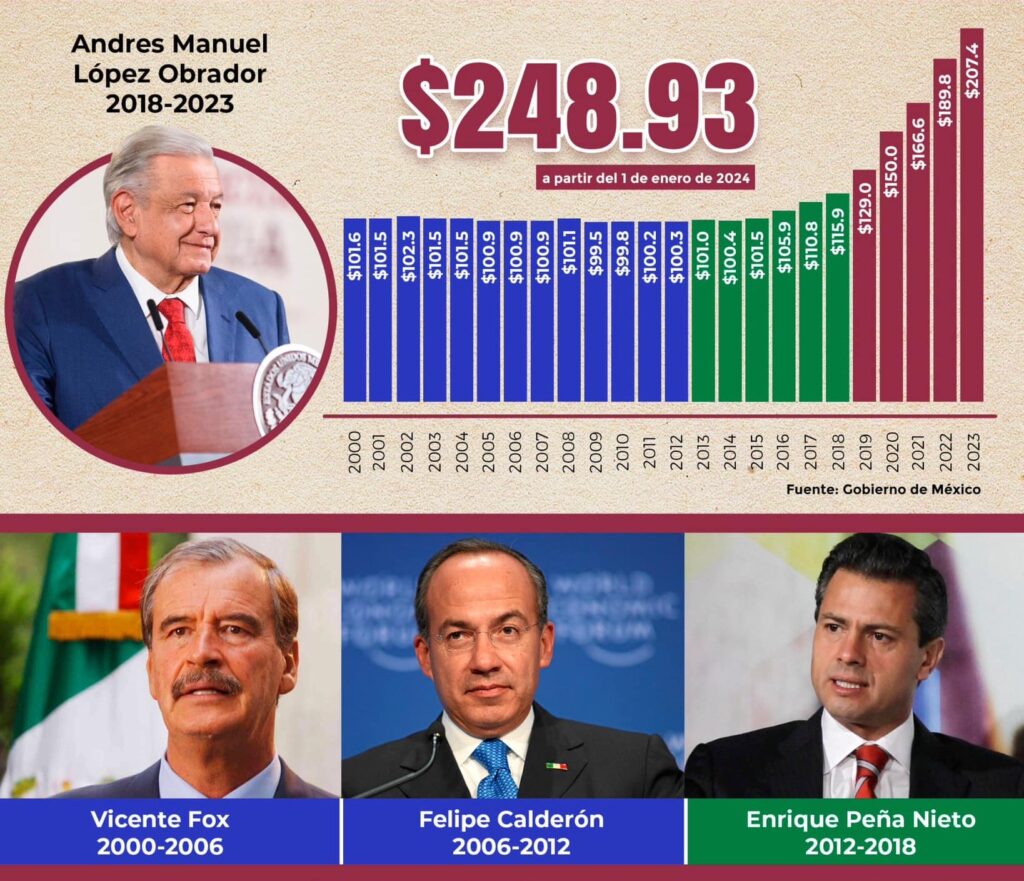Mexico Implements ‘Historic’ 20% Minimum-Wage Hike
Los Angeles, December 4, 2023 (mexicosolidarity.com) Marking his five-year anniversary in office last Friday, December 1, President Andrés Manuel López Obrador (AMLO) announced a 20% boost to the national minimum wage. Effective on New Year’s Day, the base wage for 2024 will be 249 pesos (about US$14.25) for an eight-hour day in most of the country. Along the US-Mexico border, where the cost of living is higher, the rate will also rise 20%, reaching a daily 375 pesos, or about US$21.50.
The latest increase—set annually by the National Commission on Minimum Wages, a tripart board of labor, business and government representatives—fulfills AMLO’s campaign promise to double the wage rate in real terms, which was 88 pesos in 2018.
“Something like this had not happened for at least 50 years, which is why I say it is historic,” said López Obrador.
Despite record global inflation in recent years, similarly large pay hikes every January 1 since 2019, his first full year in office, have already nearly doubled the buying power of minimum-wage earners, who make up about a third of Mexico’s workforce.
Along with other pro-worker legislation passed by Congress, where the president’s MORENA party has a majority, the AMLO administration’s minimum-wage policy has been a key factor behind the falling working-poverty rate, according to economist Gerardo Esquivel, a former Bank of Mexico official. As he notes in a recent paper, relying on wage data alone, the level of poverty fell among jobholders between 2018 and 2022, from 40.7% to 38.5%, even while the Mexican economy shrunk slightly during the pandemic years. Meanwhile, the overall poverty rate, reflecting the impact of more robust social spending as well as new pro-worker policies, plunged 7.5% during the same period.
The government’s historic boosts to the minimum wage represent a fundamental break with the policies of previous neoliberal governments that allowed it to lose three-quarters of its value between 1977 and 1996, and then kept it at about five dollars a day for the next two decades—part of a strategy to lure investment.

AMLO, whose trademark motto—“For the good of everyone, the poor come first”—earned him the establishment media’s wrath from the start of his career, has made raising the pay floor a central part of his platform since his first presidential campaign in 2006, as part of an overhaul in Mexico’s political economy.
Other recent reforms benefiting workers include a ban on subcontracting, which restored workplace and social-security rights to 2.7 million employees, and new regulations to democratize labor unions, making them accountable to their members. Other MORENA legislation currently in the works would reduce Mexicans’ workweek to 40 hours, down from 48—the longest workweek among OECD nations—an initiative expected to pass with broad support this month, despite objections from rightwing officials, including Senator Xóchitl Gálvez, the leading opposition candidate in next year’s presidential election.
Edited by José Luis Granados Ceja in Mexico City.

